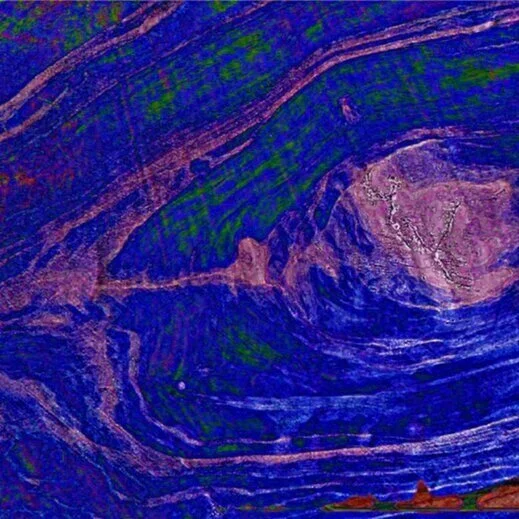Antarctica Ice Shelves - Loss and Instability
The Art
The Graph
What’s Alarming
Antarctica Ice Shelves Show Increasing Loss and Instability
Thwaites Glacier, located on the north coast of West Antarctica, is the widest glacier on Earth, larger than England, Wales and Northern Ireland combined. Ice loss from the glacier is significant and has doubled over the last 30 years, contributing to about 4% of all global sea-level rise and potentially up to several meters by the end of the century if losses continue at current rates.*
Thwaites Glacier and Pine Island Glacier in the Amundsen Sea Embayment are among the fastest changing outlet glaciers in West Antarctica, and though the potential consequences for global sea level rise are significant, scientists are challenged to make accurate predictions since many of the processes that affect the weakening of ice shelves and ground line retreat are not well understood.
“…Here, we combine multisource satellite imagery with modeling to uncover the rapid development of damage areas in the shear zones of Pine Island and Thwaites ice shelves. These damage areas consist of highly crevassed areas and open fractures and are first signs that the shear zones of both ice shelves have structurally weakened over the past decade. Idealized model results reveal moreover that the damage initiates a feedback process where initial ice shelf weakening triggers the development of damage in their shear zones, which results in further speedup, shearing, and weakening, hence promoting additional damage development. This damage feedback potentially preconditions these ice shelves for disintegration and enhances grounding line retreat. The results of this study suggest that damage feedback processes are key to future ice shelf stability, grounding line retreat, and sea level contributions from Antarctica. Moreover, they underline the need for incorporating these feedback processes, which are currently not accounted for in most ice sheet models, to improve sea level rise projections…”**
*International Thwaites Glacier Collaboration: Thwaites Glacier Facts
https://thwaitesglacier.org/about/facts
**PNAS Vol. 117/No. 40
Damage accelerates ice shelf instability and mass loss in Amundsen Sea Embayment
Stef Lhermitte https://orcid.org/0000-0002-1622-0177 s.lhermitte@tudelft.nl, Sainan Sun https://orcid.org/0000-0002-1614-2658, Christopher Shuman, +4 , Bert Wouters https://orcid.org/0000-0002-1086-2435, Frank Pattyn https://orcid.org/0000-0003-4805-5636, Jan Wuite https://orcid.org/0000-0001-9333-1586, Etienne Berthier https://orcid.org/0000-0001-5978-9155, and Thomas Nagler https://orcid.org/0000-0003-1298-8469-
September 14, 2020, 117 (40) 24735-24741, https://doi.org/10.1073/pnas.1912890117


















